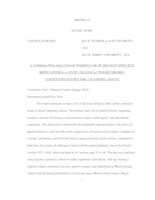- Collection:
- Atlanta University and Clark Atlanta University Theses and Dissertations
- Title:
- A Comparative Analysis of Women's Use of the Most Effective Birth Control: A Study on Long-acting Reversible Contraception for Family Planning Choices
- Creator:
- Clinton, Kortney
- Date of Original:
- 2024-05
- Subject:
- Degrees, Academic
Dissertations, Academic - Location:
- United States, Georgia, Fulton County, Atlanta, 33.749, -84.38798
- Medium:
- born digital
- Type:
- Text
- Format:
- application/pdf
- Description:
- This study examined women's use of the most effective birth control method in terms of family planning choices. The primary goal was to identify factors impacting women's choices, focusing on socioeconomic status, health equity, and educational aspirations. The study used a framework that integrated intersectionality, the theory of planned behavior, and the Afrocentric perspective, focusing on the complex interplay of societal, intentional, and historical factors impacting birth control choices. Quantitative data from the Centers for Disease Control and Prevention National Survey for Family Growth 2017'2019, which included 6,141 women aged 15 to 49. The data was analyzed using logistic regression, which revealed significant correlations, with age having a negative impact, education having a positive impact, and identifying as Black strongly related with decreased probabilities of using the most effective birth control. Racial disparities in using long-acting reversible contraception have been discovered, prompting more research into the complex connections between socioeconomic factors, cultural influences, and healthcare access. The conclusions drawn from the findings underscore the need for specific reproductive health initiatives for Black women, considering age, education, and race-specific patterns. The study focused on reducing inequities in long-acting reversible contraception use and promoting informed decision-making among this demographic. In a broader perspective, the study covers complex challenges in reproductive health outcomes and choices for family planning that are influenced by education level, birth control use, and racial disparities. The study contributes to understanding the many barriers experienced by minority women and attempts to guide future strategies that address these problems. This research is significant because it addresses decades of racial health disparities. Despite efforts to increase reproductive healthcare access, minority women face many barriers, including a lack of services, higher uninsured rates, lower education, socioeconomic status, and racial bias. The study is consistent with the reproductive justice concept, emphasizing fundamental human rights and particular challenges of minority women in reproductive health. By examining these concerns, the study contributes to formulating policies that address inequities and systemic biases, promoting equitable reproductive rights for all women.
- External Identifiers:
- Metadata URL:
- http://hdl.handle.net/20.500.12322/cau.td:2024_kortney_clinton
- Rights Holder:
- Clark Atlanta University
- Holding Institution:
- Atlanta University Center Robert W. Woodruff Library
- Rights:
-
